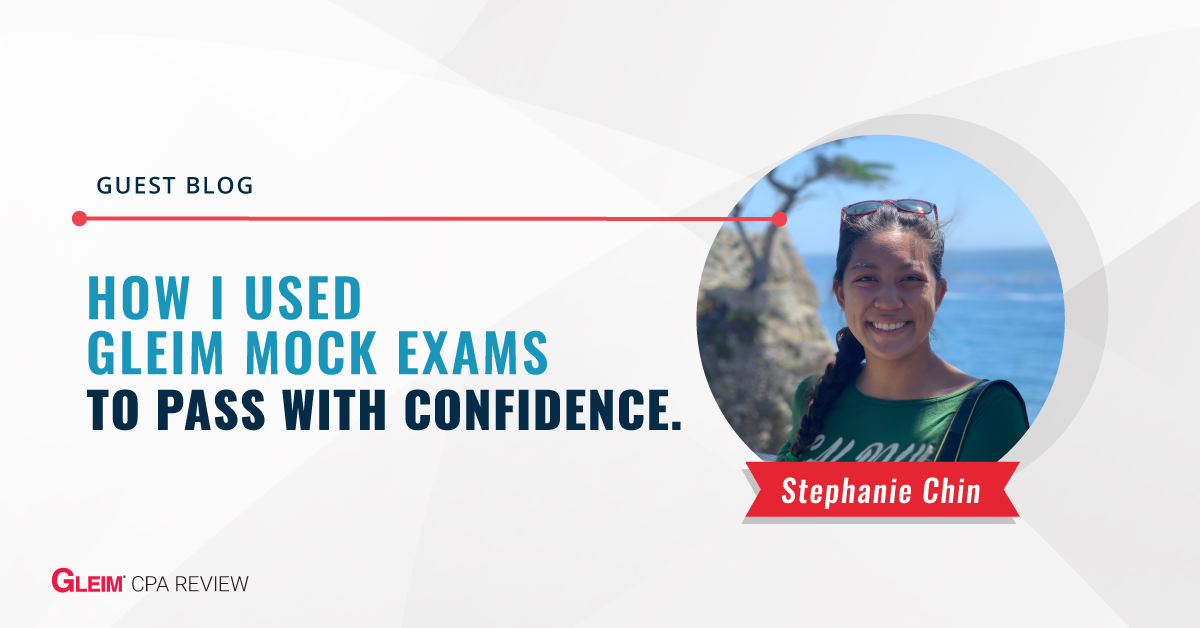Contact Us : 800.874.5346 International: +1 352.375.0772

[By: Stephanie Chin]
Feeling ready for the CPA Exam can seem next to impossible. First you have to jump through a million hoops to even register, then study for weeks to months. Once you’ve done that preparation, the exam itself isn’t even straightforward. It’s a four hour ordeal, composed of 5 testlets that you’re expected to budget time appropriately for. You could have done all of the preparation in the world, but if you misallocate your time, it could be the difference between a passing and failing score. This is where the mock exams come in.
Gleim offers two mock exams at the end of the CPA review course as a way to test your final readiness for the exam. They’re structured exactly like the actual exams at Prometric, and are the perfect way to check not only your knowledge, but your readiness for the experience of the exams themselves.
Like most people, I tend to get pretty flustered in high pressure situations, and I know that when I sit down for those exams, all common sense flies out the window. Thankfully, I’ve found that simulating the test taking environment before it’s actually time for the real deal helped relax my nerves, and helped me focus on what really mattered – getting the questions right.
Taking the mock exams that Gleim offered helped me practice getting the timing right, and figure out how much time I should budget for each testlet. I used the Gleim study guide as a baseline for budgeting my time, and took the first mock exam based on that.
After you take the exam, the review course assesses your weak points, and tells you which units and subunits you should go back to focus on. I also try to use the first rehearsal as a chance to fine tune the time I allot for each testlet, as I know each person has their strong and weak points. I’ve found that in general, I take a little longer on the simulation questions than average, so I budget a little more time for myself to do those, and push myself to finish the multiple choice questions faster.
When I take the mock exams, I also try to make sure my surrounding environment emulates the test as much as possible – so I’ll stick my phone in a drawer, and wear a mask while I take it so that I can get acclimated to the sensation. Since I know what my ideal time allocation is, I’ll write it down on a little scratch paper, and try to mark when my cutoff times are so that I’m not constantly doing mental math on how many minutes I think I have left.
The mock exams look and feel just like the real CPA Exam, down to the launch code screen, which I found very soothing when I went in to take the real thing. With something as stressful as the CPA, it’s nice to have as few surprises as possible.
I try to take the first rehearsal a bit more than a week before my test date, and then the second one just a few days before, so that I have adequate time to do some additional review if needed. I’ve definitely found that taking the practice exams has alleviated a lot of stress associated with the test, since it means that I’ve had a chance to fine tune the details. I also appreciate the breakdown at the end, where the exam review points out where you need to focus. With the amount of material the test covers, it can be overwhelming to figure out which sections you may need to study a bit more on.
Especially in the final days before the exam, it can feel like there’s so much material, and so little time left, and oftentimes I’ll worry that I’ve already forgotten the earlier study units, so taking a final, comprehensive exam is really helpful. Because the review course is broken up into small, digestible subunits, it also makes it easy in the exam review to see exactly where you need to focus so you’re not wasting time reviewing material you already know. I think it’s probably impossible to ever feel completely prepared for the CPA Exam, but this review course most definitely helps you get as close as possible.